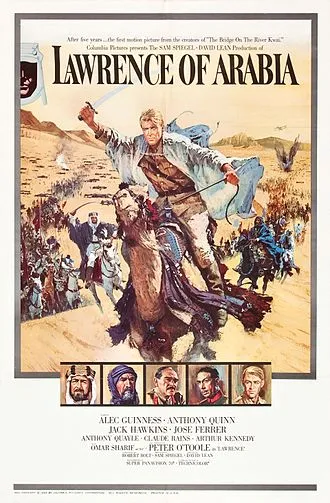Historical accuracy of Lawrence of Arabia

Historical accuracy of Lawrence of Arabia

Characters
T.E. Lawrence
The film captures Lawrence's charisma and complex personality, but it also romanticizes and simplifies some aspects of his life and actions. While Lawrence was a real figure who played a significant role in the Arab Revolt, the film takes some creative liberties.
Prince Feisal
Prince Feisal's portrayal is generally accurate in depicting his diplomatic skills and his role in the Arab Revolt. However, the film simplifies the political complexities of the time and the various factions involved.
Sherif Ali
Sherif Ali is a composite character, representing various Arab leaders. While he embodies the spirit of the Arab fighters, he's not a single historical figure.
Auda Abu Tayi
Auda Abu Tayi was a real tribal leader, and the film portrays his warrior spirit and tribal allegiances. However, some aspects of his character and actions are dramatized for cinematic effect.
General Allenby
General Allenby's portrayal is largely accurate, depicting his strategic thinking and his role in the British war effort in the Middle East.
The portrayal of Turkish soldiers
The Turkish soldiers are often portrayed as the antagonists in the film. While this reflects the historical conflict, the portrayal of individual Turkish characters may be limited and lack nuance.
Story
T.E. Lawrence's role in the Arab Revolt
The film depicts T.E. Lawrence's involvement in the Arab Revolt against the Ottoman Empire during World War I. This is a historical fact, and the film portrays his role as a liaison officer and military advisor to the Arab forces.
The attack on Aqaba
The film portrays the daring attack on Aqaba, a strategically important port city. While the attack did occur, the film dramatizes some aspects and simplifies the complexities of the operation.
The capture of Damascus
The film depicts the capture of Damascus by Arab forces with Lawrence's assistance. This was a significant victory in the Arab Revolt and a turning point in the war in the Middle East.
His relationship with Prince Faisal
The film depicts Lawrence's relationship with Prince Faisal, a leader of the Arab Revolt. While they did work together, the film's portrayal of their interactions and personal dynamics is likely fictionalized to some extent.
The use of guerrilla tactics
The film shows Lawrence's adoption of guerrilla tactics to fight the Ottoman army. This is historically accurate, as he recognized the effectiveness of these tactics in the desert environment.
The train attacks
The film depicts Lawrence's involvement in attacks on Turkish trains. These attacks were real events and played a role in disrupting Ottoman supply lines.
The film's focus on Lawrence's heroism
The film emphasizes Lawrence's heroism and his role in the Arab Revolt. While he played a significant role, the film's portrayal may exaggerate his individual contributions and downplay the efforts of the Arab forces themselves.
Setting
The political context of the war
The film provides a good overview of the political context of World War I in the Middle East, including the Ottoman Empire's decline and the competing interests of the British and French. This historical backdrop is crucial to the story.
The depiction of Arab culture
The film attempts to portray aspects of Arab culture and traditions. While some elements are accurate, others may be romanticized or simplified for a Western audience.
The desert landscapes
The film's stunning cinematography captures the vast and dramatic landscapes of the Arabian desert. This is a visually impressive and accurate portrayal of the environment.
The brutality of war
The film does not shy away from depicting the brutality and violence of war, including scenes of torture and death. This is a realistic portrayal of the harsh realities of conflict.
